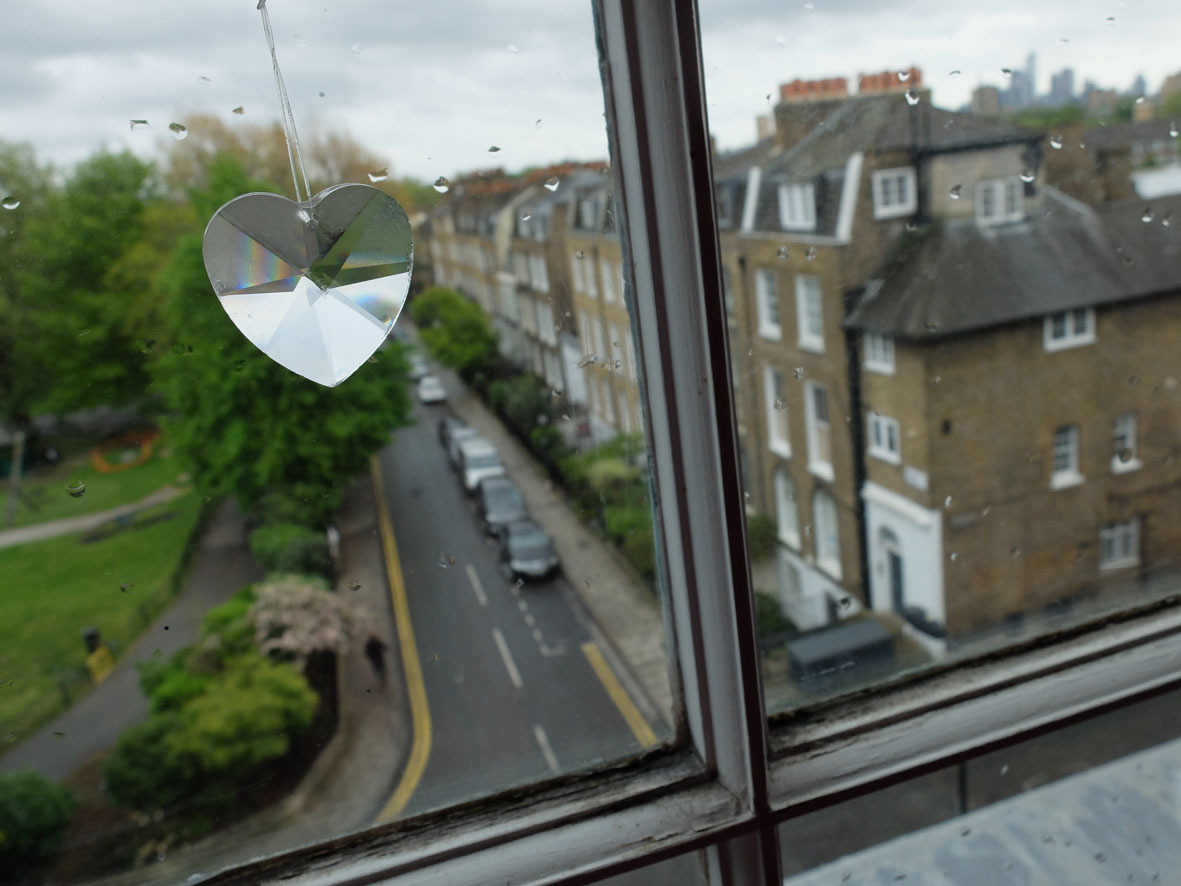03 May The View from My Window: Love and Loss in London Under Lockdown.
 Written by Sarah Pletts for Jillian Woods’ Diary of a House Blog in New Zealand
Written by Sarah Pletts for Jillian Woods’ Diary of a House Blog in New Zealand
From my window, I see an occasional car. The main road beyond is busier – buses, delivery vans and a blue flashing light go past. The park opposite is green and lush. One or two pedestrians and cyclists navigate to or from the super-market, corner shop, chemist or post office. A small construction site is still growing up brick by brick, in the next street. The towers of the financial centre of the city are in the far distance.
I heard a historian speak on BBC Radio 4 when there were only a few cases of Covid-19 in the UK. He said, “In the future we will speak of ‘before’ and ‘after’ Coronavirus.” Remembering that snippet of news interview now seems like ancient history. London – recently a thriving multi-cultural city of 9 million is now quiet enough to hear the birds sing.
We have lost people, lots of them. More have died than were killed in the London Blitz. Statisticians are the new eagerly awaited storytellers. The exact figures are endlessly quoted and discussed – a messy set of deductions, additions and multiplications.
An alarming number of the dead are from black/asian/minority/ethnic backgrounds. Many key workers are in this demographic. Despite the covert racism in ‘Brexit’ divisions, some of these doctors, nurses, carers and bus drivers are now being celebrated on the more often white pages of the tabloid on-line press. Yesterday, on my Zoom call at 11am we joined a UK wide minute of silence to honour the key workers who have died so far.
Despite recent fluctuations, the roads are still more like the quiet that happens when England plays a world cup match and every ‘white van man’ was at the pub watching the game.
I went to King’s Cross in the city centre for an emergency dental appointment. Usually one of the busiest thoroughfares in London, the Euston Road was sparse with traffic. Shops in the area were shuttered as most are elsewhere. The forecourt of Kings Cross station was eerily quiet. It has been my only foray out of Hackney in weeks.
Pubs are shut, many boarded up with the prospect of staying that way for months. London’s extraordinary cultural spread of theatres, clubs, galleries, restaurants and cafés are closed. Freelance creative people and those on zero hours contracts are at home with their normally insecure incomes slashed.
Food banks exist to catch some of those who fall between the funding gaps and ‘Universal Credit’s £94 a week, (if you’re lucky enough to navigate the system). People queue at our local food bank at two metre intervals.
All of city life is now calibrated in two metre gaps. We weave along pavements – jogging, walking, cycling two metres apart. For those who are not struggling to get to essential work, in home-made mask and latex gloves on busy rush hour (reduced service) tube trains, we head to the park for daily exercise.
The last six weeks have been sunny. This is almost as unusual as the pandemic situation. Sky blue skies, un-streaked by vapour trails are recording 35% of the normal pollution levels. While those who are ill struggle for breath, the rest of us can at least breathe deeply.
Despite the high population density, London is still a very green city. Parks are bustling with people taking their hour of exercise outside. A few rebels pause to sit and enjoy the newly fresh air. Most people move with purpose. We dodge the panting breath of seemingly healthy runners. Parents use ingenuity to entertain their kids with scooters, Frisbees and balls (no team games allowed).
I can tell you what I see, but more than ever, London is full of parallel universes. I can see what is visible in my neighbourhood from the limited time I spend outside. I have an idyllic view from my privileged perch. I am one of a large household of the well. Others are not so lucky.
I know over twenty people who have had the virus, been knocked out of circulation into their beds for a week or two. Acquaintances have been hospitalised. Friends of friends have died. I am not reporting from the front line. I fear that as this time ebbs, more grief, more trauma, and more loss of hope will be visible.
I have seen our Prime Minister Boris Johnson on TV. Known for his arrogance, he ignored his own advice to avoid shaking hands and stay indoors, and caught Covid-19. Returning to our screens with dark circles around his eyes, post virus, he continues to emulate Churchill’s cadences. Many of us hope that his brush with mortality will chasten him. We hope that this time will bring opportunities to implement greener less petrochemical industry friendly policies. But, there are indications of a disturbing urge from those in power to return to ‘business as usual’.
What are the positive signs in this time of Coronavirus? I enjoy cleaner air, quieter streets, raucous bird song. I am relieved to have some time out from social busyness. Time to re-assess our food chains feels necessary. I’ve planted my first vegetables. I love quality time at home eating lovingly prepared food together with my housemates. I appreciate the gratitude that arises for the good things we still have.
We chat to friends around the world, who are now as near as those a few miles away on-line, but as unreachable in person. “What’s it like in London?” they ask. I am not necessarily a reliable witness. I can tell you what it is like in this house. I have a sense of how it is for my immediate neighbours as we chat, calling across the garden fence or from our doorsteps. I have an impression of how it seems in this neighbourhood. Although cases of domestic violence have doubled, so I know all is not well behind closed doors.
There are different attitudes to this crisis among different generations, and different social demographics. Many are under huge pressure, but with a range of causes. While isolation is often really difficult, there are also ways in which people are coming together, helping each other and showing kindness.
There seems to be a quirky British eccentricity about ways in which we are showing solidarity – Monty Python meets the Royal Family. The 100 years old Captain Tom Moore has captured the nation’s imagination by pushing his walker up and down outside his house in aid of the NHS. Guaranteed to bring a tear to the eye, he has so far raised twenty-nine million pounds.
Children are creating pictures of rainbows to put in their windows. Then at 8pm each Thursday, we clap. Doors and window are flung open, and for a good few minutes we applaud to ‘care for the carers’. Where we live this might include banging pans, cranking a football rattle or shaking Maracas. Curiously charming, it does raise my spirits.



No Comments